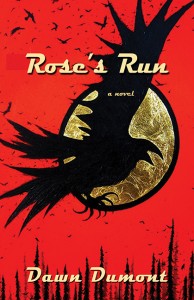January 4, 2015
Rose’s Run by Dawn Dumont
 Well, if a holiday has to eventually end, Rose’s Run by Dawn Dumont is a pretty good book to go out on, a book that’s funny, breezy and heartwarming, and then manages to include a terrifying demon in the mix who feeds on the strength of women, so I was hooked in a cannot-turn-out-the-light-until-I’m-done kind of way, an I’m-going-to-have-nightmares kind of way (and I did!), and I haven’t been so gripped a scary book since I read The Troop by Craig Davidson/Nick Cutter a year ago.
Well, if a holiday has to eventually end, Rose’s Run by Dawn Dumont is a pretty good book to go out on, a book that’s funny, breezy and heartwarming, and then manages to include a terrifying demon in the mix who feeds on the strength of women, so I was hooked in a cannot-turn-out-the-light-until-I’m-done kind of way, an I’m-going-to-have-nightmares kind of way (and I did!), and I haven’t been so gripped a scary book since I read The Troop by Craig Davidson/Nick Cutter a year ago.
But let’s back up a bit. The novel begins with Rose Okanese, a First Nations woman living on a reserve in rural Saskatchewan, catching her husband bonking her cousin (and his), and then him taking off with their car so she has no way to get to work at the pig-farm. She loses her job, and has also just caught her teenage daughter doing drugs—troubles compounding. And to further compound them, Rose—through a series of misunderstandings—starts a rumour that she’s going to be running in the reserve’s annual marathon. More than a few pounds overweight and a heavy smoker, Rose is an unlikely candidate for the race, but she eventually starts training, one foot in front of the other, a seemingly insurmountable challenge, but perhaps the one thing in her world she has any control over.
If things could get any worse, it seems that her daughter and her troubled friend have managed to raise a demon from the dead, a spirt called “The Dream Woman” who feeds on the strength of the women around her and seeks vengeance for the many wrongs done to them by men. One by one, the women on the reserve become possessed by the woman’s spirit, but somehow Rose remains immune—perhaps because of the extent of her own strength as she begins to get stronger, and also somehow due to the ghost of her mother who remains a protective presence.
Soon, the marathon is the least of Rose’s problems as she is forced to battle with The Dream Woman, freeing the local women from her power (and the local men from their brutal justice), protecting her daughters in the process and sending the spirit back into the earth where she came from.
Kind of preposterous, yes, but Dawn Dumont (a comedian and broadcaster whose first novel, Nobody Cries at Bingo, was shortlisted for two Alberta book awards) balances the supernatural elements with real emotional connections between her characters, Rose’s down to earth point of view, and a wonderful ribald sense of humour. I’ve never encountered a book that managed to be hilarious and terrifying at once—and the humour never ceases, even when the suspense is at its height, but it never gets too silly either. Which makes for a really fantastic and engaging read.
While Rose’s Run would have benefitted from a stronger edit (I stumbled on a few typos and errors; the prose could have been tighter), any problems didn’t detract from my enjoyment of the novel. I read the book with an awareness of Julie Flett’s recent comments on the importance of First Nations literature:
“Our First Nation, Métis, and Inuit communities vitally need books with text and artwork that reflect our cultures and realities. Our works are also critical resources for increasing awareness and understanding in Canadian society, contributing relevancy to literacy programs, improving curricula, at all levels, across Canada, and adding significantly to the body of Canadian literature.”
There is nothing polemical about the novel at all, but not far beneath its breezy style and humour, it certainly is political, depicting the complicated reality of life on First Nations’ reserves, and in particular the status of First Nations women (whose problems at their most extreme and not so rarely either have led to the disappearance and/or murder of more than a thousand of these people in the last two decades). Now is certainly a time in which Canadian First Nations women seem to be finally starting to receive what they’re due—see the recent critical response to the television show, “Mohawk Girls“‘; the potential for a book by a First Nations woman to be part of the Canada Reads lineup for the very first time; the Native Women’s Association of Canada receiving the 2014 Vox Libera Award from Canadian Journalists for Free Expression, and more—and a book like Rose’s Run is an inspiring part of this cultural wave.
But it’s also just a really good book, and one I read avidly. A very good way to begin a new reading year.





